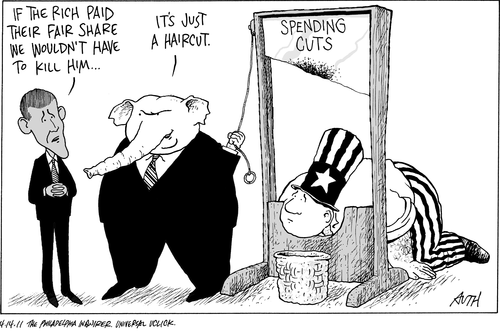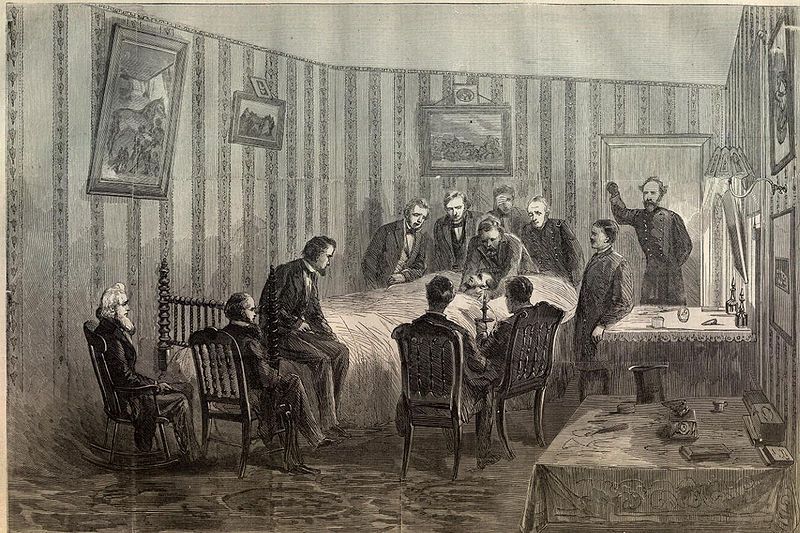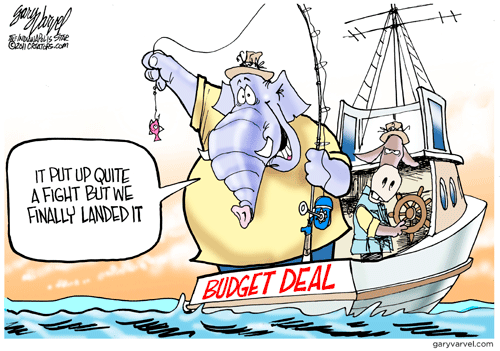“Punting the Pundits” is an Open Thread. It is a selection of editorials and opinions from around the news medium and the internet blogs. The intent is to provide a forum for your reactions and opinions, not just to the opinions presented, but to what ever you find important.
Thanks to ek hornbeck, click on the link and you can access all the past “Punting the Pundits”
 E.J. Dionne Jr.: Obama’s deficit speech: Worthy of a president
E.J. Dionne Jr.: Obama’s deficit speech: Worthy of a president
President Obama has finally decided to take his own side in the philosophical struggle that is the true engine of this nation’s budget debate.
After months of mixed signals about what he was willing to fight for, Obama finally laid out his purposes and his principles. His approach has difficulties of its own, and much will depend on execution. But the president was unequivocal in arguing that the roots of our fiscal problems lie in the tax cuts of the past decade that we could not afford. And he raised the stakes in our politics to something more fundamental than dry numbers on a page or computer screen.
Robert Reich:Mr. President: Why Medicare Isn’t the Problem, It’s the Solution
I hope when he tells America how he aims to tame future budget deficits the President doesn’t accept conventional Wasington wisdom that the biggest problem in the federal budget is Medicare (and its poor cousin Medicaid).
Medicare isn’t the problem. It’s the solution.
The real problem is the soaring costs of health care that lie beneath Medicare. They’re costs all of us are bearing in the form of soaring premiums, co-payments, and deductibles.
President Obama in his speech on Wednesday confronted a topic that is harder to address seriously in public than sex or flatulence: America needs higher taxes.
That ugly truth looms over today’s budget battles, but politicians have mostly preferred to run from reality. Mr. Obama’s speech was excellent not only for its content but also because he didn’t insult our intelligence.
There is no single reason for today’s budget mess, but it’s worth remembering that the last time our budget was in the black was in the Clinton administration. That’s a broad hint that one sensible way to overcome our difficulties would be to revert to tax rates more or less as they were under President Clinton. That single step would solve three-quarters of the deficit for the next five years or so.
Greg Sargent: Obama made the moral case for what it means to be a Democrat
For some time now, a bunch of us have been wondering when – or whether – Obama would step up and make a strong case for an expansive vision of Democratic governance. With Republicans initiating what may be the most consequential argument over the proper role of government in decades – a debate over the legacy of the great liberal achievements of the 20th Century – we’ve all been wondering whether Obama would respond with a level of ambition and seriousness of purpose that he’s shown when taking on other big arguments.
By this standard – in rhetorical terms – it’s fair to say Obama delivered. Sure, the speech trafficked a bit in the usual “speaking hard truths to both sides” positioning. And speeches are the easy part: Obama’s words jarred against recent actions, and what Obama actually does in the months to come will be what either ratifies today’s promises or renders them meaningless. But Obama did offer perhaps the most ambitious defense he may have ever attempted of American liberalism and of what it means to be a Democrat.
Richard (RJ) Escow: The President’s Deficit Speech: Time to Keep Up the Pressure
The President speech on the Federal deficit marked a brilliant return to what might be called his “holographic” style. Like a hologram, the President’s speech was beautiful and evocative and shimmered with light. But like a hologram, what you see depends on where you stand.
Many progressives will hear a brilliant defense of government’s role in the economy, and of the role that progressive taxation plays in a fair-minded economic system. Conservatives(those who aren’t absolutely nuts) will hear a ringing endorsement of a plan that would downsize government and benefit the wealthy. And they’ll love the President’s “debt triggers,” which could force the government to enact drastic cuts if targets aren’t met.
This holographic quality, the ability to present himself as all things to all people, is the President’s unique gift – unless, in the end, it turns out not to have been a gift at all.
Laura Flanders: When Will It Be Time to Cut Military Spending?
On Tuesday, April 12, people in more than 35 countries, as well as Columbus, Dallas, Kansas City and dozens of other cities throughout the United States participated in the first Global Day of Action on Military Spending.
In DC, they most definitely are sitting this one out.
In fact, after weeks of budget brinksmanship, Congress emerged with a tentative so-called compromise that was unable to get a single cut made to spending on the US military.
Christopher Hellman at TomDispatch recently added up all the hidden military-related spending in the budget and came to a startling number for fiscal year 2012. Something like $1.2 trillion dollars. That’s trillion with a T. In this year’s budget they admit to $670 billion or so, plus another $41 billion for Homeland Security and $76.6 billion for “military construction” and Veterans Affairs–an INCREASE over last year.
Robert Sheer The False Debate on the Debt
In the ever-so-smug company of the rich and powerful it is a given that there is never to be any expression of remorse or other acknowledgement of the pain they have inflicted on the lesser mortals they so cavalierly plunder. It’s convenient for them that the media and the politicians, which they happen to own, rarely connect the dots between the scams that made the rich so rich and the alarming rise in the federal debt that is crushing this nation.
The result of this purchased public myopia is that we are left with an absurd debate over how deeply to cut teachers’ pensions and seniors’ medical benefits while preserving tax breaks for the superrich and their large corporations. At a time when 10 million American families will have lost their homes by year’s end, when $5.6 trillion in home equity has been wiped out, when most Americans face steep unemployment rates and stagnant wages, a Democratic president is likely to compromise with Republican ideologues who insist that further cuts in taxes for the rich is the way to bring back jobs.
Jonathan Capehsrt: Boehner plays an expensive, ‘crazy’ game of chicken with debt ceiling
If I’ve learned anything from my obsession with raising the debt ceiling, it’s that playing chicken with the full faith and credit of the United States is a very dangerous game. And yet there is a report today that one of the adults on Capitol Hill – yeah, I’m talking about you, Speaker Boehner – is seeking a way out of the rules of the game.
According to an exclusive report from Ben Smith at Politico, the Ohio Republican “has been reaching out to top Wall Street players asking how close Congress can get to the May 16th deadline (or July 8th drop-dead date) for raising the debt limit without seriously unnerving financial markets.” Needless to say, Boehner’s inquiry is unnerving big guns on Wall Street. “They don’t seem to understand that you can’t put everything back in the box,” one executive told Smith. “Once that fear of default is in the markets, it doesn’t just go away. We’ll be paying the price for years in higher rates.”


 The House and Senate will put the finishing touches on last week’s budget crisis over the budget for 2011. While the President and the Republicans were busy in front of the cameras praising themselves for “victory”, the Congressional Budget Office was counting the “beans”. Remember the much publicized $38.5 billion in cuts? Well, it will only reduce the deficit by $352 million. That is
The House and Senate will put the finishing touches on last week’s budget crisis over the budget for 2011. While the President and the Republicans were busy in front of the cameras praising themselves for “victory”, the Congressional Budget Office was counting the “beans”. Remember the much publicized $38.5 billion in cuts? Well, it will only reduce the deficit by $352 million. That is
Recent Comments